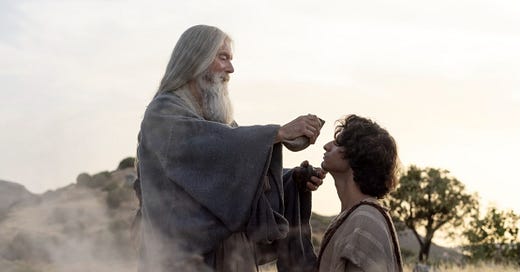Epic Adventure on the Small Screen
The life of a shepherd boy gets the Hollywood treatment—in all the right ways
Historically, my opinion of faith-based filmmaking has been far from flattering. To quote myself from a few years ago,
If I had to summarize the typical faith-based film in one word, it would be “shamefully, embarrassingly subpar.” Okay, so that’s technically three words.
Here’s the deal. As a Christian who loves visual stories, I am, more often than not, ashamed and embarrassed by the lack of creativity displayed by those who claim adherence to (and often inspiration from) the original Creator.
I have bemoaned the bastardization of Christian filmmaking. I have critiqued the bait-and-switch tendencies of Christian creatives. I have highlighted the need for faith-based filmmaking to experience a radical shift. Some might be tempted to call me Mr. Grumpy Gills.
That’s why it’s always a joy to discover a faith-based project that demonstrates creative and artistic excellence, worthy of praise and promotion. And in Amazon’s new television series, The House of David, I have discovered such a project:
House of David’s large budget and high production values are evident even in the trailers. There is genuine talent behind and in front of the camera. Everything from script to sets to cinematography demonstrates a strong commitment to artistic excellence. Even elements like sound design and fight choreography are impressively proficient.
You can read my entire review of the show at Christ and Pop Culture.
In other television-related news, I contributed to Christ and Pop Culture’s recent article “Favorite TV of 2024” with a short review of another Amazon Prime streaming series:
Amazon’s The Rings of Power came into the world with an Oliphaunt-sized amount of controversy—and not entirely without reason. The show’s first season provided a mixed bag of entertaining spectacle and strong production values alongside frustrating deviations from Tolkien canon. What was supposed to be a climactic revelation in Season One (“Sometimes to find the light, we must first touch the darkness”) turned out to be a head-scratching anomaly, like seeing a meme that drastically misquotes an historic personality. At the end of the season, hope for a rousing Middle-Earth adventure seemed to fade.
But we were, all of us, deceived, for a second season was made.
You can read the entire review here.





Thanks for this, I was just wondering yesterday how good this would actually be.